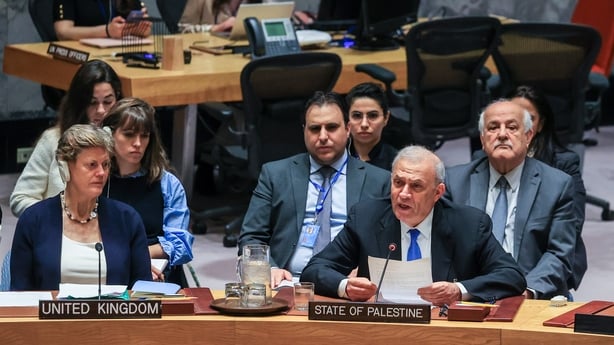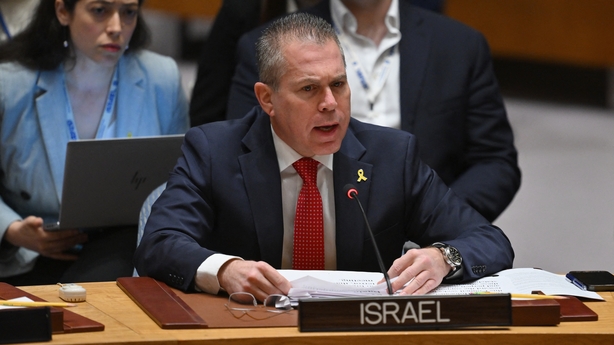The United States has vetoed a Palestinian request for full membership of the United Nations.
During a meeting of the Security Council this evening, a draft resolution recommending to the General Assembly that "the State of Palestine be admitted to membership of the United Nations" received 12 votes in favour and two abstentions.
But the single no vote cast by the United States defeated the move.
The United States had made their voting intentions clear ahead of the meeting, but the Palestinian representatives had asked the Council to proceed with the vote.
In his explanation of vote, the US deputy ambassador to the United Nations Robert Wood said the US veto did not represent opposition to Palestinian statehood "but instead is an acknowledgment that it will only come from direct negotiations between the parties".
Representatives of the US mission in the days ahead of the vote told reporters that the US position was that they would not support full Palestinian membership until there was a bi-lateral peace agreement in place between Israel and the Palestinians.
"We also have long been clear that premature actions here in New York, even with the best intentions, will not achieve statehood for the Palestinian people," Ambassador Wood told the Council.
Ahead of the vote, Amar Bendjama, the Ambassador of Algeria, which submitted the draft resolution to the Council said it was "a critical step towards rectifying a longstanding injustice."
The Russian Ambassador to the United Nations, Vasily Nebenzia called the US veto "a hopeless attempt to stop the inevitable course of history".
"The results of the vote where Washington was practically in complete isolation, speak for themselves," he said.
Reacting to the vote, the Tánaiste Michéal Martin said he was "disappointed" at the outcome of the UN Security Council vote.
"It is past time for Palestine to take its rightful place amongst the nations of the world," Mr Martin wrote on social media platform, X.

The Palestinians are currently a non-member observer state, a de facto recognition of statehood that was granted by the UN General Assembly in 2012.
However, an application to become a full UN member needs to be approved by the Security Council and then at least two-thirds of the General Assembly.
Read more: Why Palestine's bid for UN membership will fail
The Palestinian push for full UN membership comes six months into a war between Israel and Hamas in Gaza, and as Israel is expanding settlements in the occupied West Bank.
"Recent escalations make it even more important to support good-faith efforts to find lasting peace between Israel and a fully independent, viable and sovereign Palestinian state," UN Secretary-General Antonio Guterres told the Security Council.
"Failure to make progress towards a two-State solution will only increase volatility and risk for hundreds of millions of people across the region, who will continue to live under the constant threat of violence," he said.
Direct talks
Israel's UN ambassador Gilad Erdan said Palestinians failed to meet the criteria to become a full UN member, which he outlined as: a permanent population, defined territory, government, and capacity to enter relations with other states.
"Who is the council voting to 'recognise' and give full membership status to? Hamas in Gaza? The Palestinian Islamic Jihad in Nablus? Who?" Mr Erdan asked the Security Council.
He said granting full UN membership to the Palestinians "will have zero positive impact for any party, that will cause only destruction for years to come, and harm any chance for future dialogue."
The UN Security Council has long endorsed a vision of two states living side by side within secure and recognised borders.
Palestinians want a state in the West Bank, east Jerusalem and Gaza, all territory captured by Israel in 1967.

The Palestinian Authority, headed by President Mahmoud Abbas, exercises limited self-rule in the occupied West Bank. Hamas ousted the Palestinian Authority from power in Gaza in 2007.
Ziad Abu Amr, special envoy of Mr Abbas, asked the United States: "How could this damage the prospects of peace between Palestinians and Israelis? How could this recognition and this membership harm international peace and security?"
"Those who are trying to disrupt and hinder the adoption of such a resolution ... are not helping the prospects of peace between Palestinians and Israelis and the prospects for peace in the Middle East in general," he told the Security Council.
Mr Abu Amr said full Palestinian UN membership was not an alternative for serious political negotiations to implement a two-state solution and resolve pending issues, adding: "However, this resolution will grant hope to the Palestinian people hope for a decent life within an independent state."
Additional reporting from Reuters







